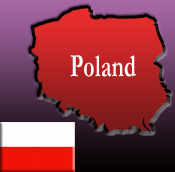Gdansk strike threatens "Solidarity" anniversary
 Warsaw - Gdansk is famous the world over as the striking shipyard that toppled communism in Poland, but now a 20th anniversary celebration has had to be relocated - because the shipyard is threatening to go on strike.
Warsaw - Gdansk is famous the world over as the striking shipyard that toppled communism in Poland, but now a 20th anniversary celebration has had to be relocated - because the shipyard is threatening to go on strike.
The shipyard, birthplace to the Solidarity movement led by Lech Walesa, was to have played host to various European leaders on June 4, but worried officials have now switched the party to the southern city of Krakow.
The announcement of the change of venue was announced by Prime Minister Donald Tusk on Thursday, over security fears that a celebration of protests would, ironically, be marred by protests.
"Yes, they (the shipworkers) have a right to demonstrate," Tusk said, but also pointed to his responsibility to play the host to foreign leaders and "guarantee their security."
The unions had warned of molotov cocktails and burning tyres, Tusk said, and more extreme activists had even promised that "blood would spill" on the day.
Union leaders responded that there was no threat to the "solemnity" of the celebration, and appealed to officials to "show respect to Polish workers."
They would respect the anniversary celebrations, they said, but declined to say if they would cancel their demonstration.
The festivities will mark June 4, 1989, when Solidarity won a landslide victory in the country's first post-war, partly-free elections. Dozens of leaders are expected to attend, including German Chancellor Angela Merkel and former Czech President Vaclav Havel.
But now only a concert will still be held in Gdansk. Politicians will celebrate the anniversary in Wawel, outside Krakow, a city that draws tourists but lacks the political symbolism of Gdansk.
Gdansk's President Pawel Adamowicz accused the union of "betraying the ideals of Solidarity," and betraying Poland by announcing a strike on such an important date.
"On June 4, dozens of European leaders wanted to thank Poland for Solidarity and the peaceful uniting of Europe," Adamowicz said.
"They won't come. They won't thank us. It was supposed to be a big, happy celebration."
Protests turned violent recently as unionists clashed with police on April 29 during a congress of the European People's Party. Police used batons and tear gas and several people were injured.
Solidarity officials subsequently said they could not guarantee avoiding similar scenes in Gdansk as they could not vouch for every shipyard worker's behaviour.
The unions are demanding job security and better pay for the shipyard workers of modern Gdansk.
Since the fall of communism, the yards have run into severe financial difficulties and since 2002 have been kept afloat by state aid and production guarantees.
Gdansk once employed 17,000 people, according to Karol Guzikiewicz, Solidarity's deputy chairman in Gdansk. It now employs some 2,300 people with an average monthly salary of 1,750 zloty (532 dollars.)
The European Commission in 2005 launched an investigation into the Polish government's subsidy and declared any aid not used purely to rescue and restructure the company as illegal.
Poland then agreed to sell the yards' assets by May 2009, and use the proceeds to repay creditors and return illegal aid to the state.
But the deal alarmed workers, who worried the yards would be bought up by companies intent on asset-stripping rather than ship- building or keeping jobs.
Now as the shipyards' future is in the balance, unionists accuse politicians of "cowardice" and ignoring workers' plight as they mark a democracy that owes so much to unions.
Others say politics should be kept out of the festivities, and that Poles for a day should leave their conflicts behind to celebrate together. (dpa)